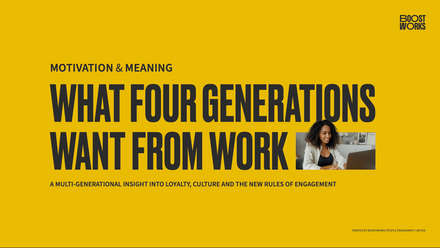REBA Inside Track: How the Flexible Working Act connects with reward strategy
At REBA, we have long been advocates of flexible working. The benefits in terms of health and wellbeing, inclusivity, productivity and engagement, not to mention attraction and retention, are well recorded.
The introduction of the Flexible Working Act highlights just how vital this element of the employee value proposition (EVP) has become across society. Research from Zest found that employers struggling to recruit said that while pay remains important, demand for flexible work terms (48%) is now the biggest factor hindering their recruitment efforts.
The ins and outs of the Flexible Working Act
The government’s Employment Relations (Flexible Working) Act will see flexible working requests become a day one right, with greater requirements on employers to consult with the employee before rejecting their flexible working request.
The new Act strengthens existing rights by enabling employees to make two statutory requests in any 12-month period – rather than the present one; reduces the waiting time for a decision from three to two months; and removes existing requirements for employees to explain what effect, if any, the change applied for would have on the employer and how it might be dealt with.
In response to this legislation, Acas will be updating its statutory Code of Practice following a consultation, launched on 12 July. The aim of the Code is to provide employers, employees and representatives with a clear explanation of the law on the statutory right to request flexible working, alongside good practice advice on handling requests in a reasonable manner.
The Act and secondary legislation is expected to come into force next summer, approximately a year after it achieved Royal Assent, to give employers time to prepare for the changes.
REBA’s Evolving EVP: meeting business and workforce change highlighted how flexibility, in terms of working conditions, job design and benefits offerings, is becoming fundamental to reward and benefits strategy. Crucially, employers will need to understand how greater flexibility will impact the whole EVP.
Considerations such as the accessibility of benefits, the potential health risks of working in different ways, as well as the impact on how to engage employees and communicate with those who may be working outside of traditional norms, need to be thought about.
Flexibility also relates to workforce planning – be it through enabling employees to study and reskill, take sabbaticals, change working patterns to meet personal needs, or step back as they near retirement. Flexibility seeps into every element of the EVP.
For reward professionals, it also raises questions about how people are paid. Should pay in general be more flexible? The rise in earned wage access services highlights the demand by employees for greater flexibility around their pay. And, with more people working multiple part-time jobs or combining PAYE work with self-employment, should employers be thinking about adjusting the point at which employees are enrolled into the pension?
With the government’s Flexible Working Act helping to strengthen the practice in UK businesses, the direction of travel is clear. The future of the UK’s workforce is rooted in employees’ health, wellbeing and sense of belonging. Embedding flexibility within your reward strategy is increasingly crucial to ensure your organisation is able to retain and attract the best talent.
The role of informal flexible working
The government has also launched a call for evidence on non-statutory flexible working to improve on knowledge of the extent of flexibility in the labour market. The aim is to increase understanding of the role of informal flexible working in meeting the needs of both employers and employees.
The call for evidence will remain open until 7 November 2023 and will help to shape the government’s approach to flexible working.







